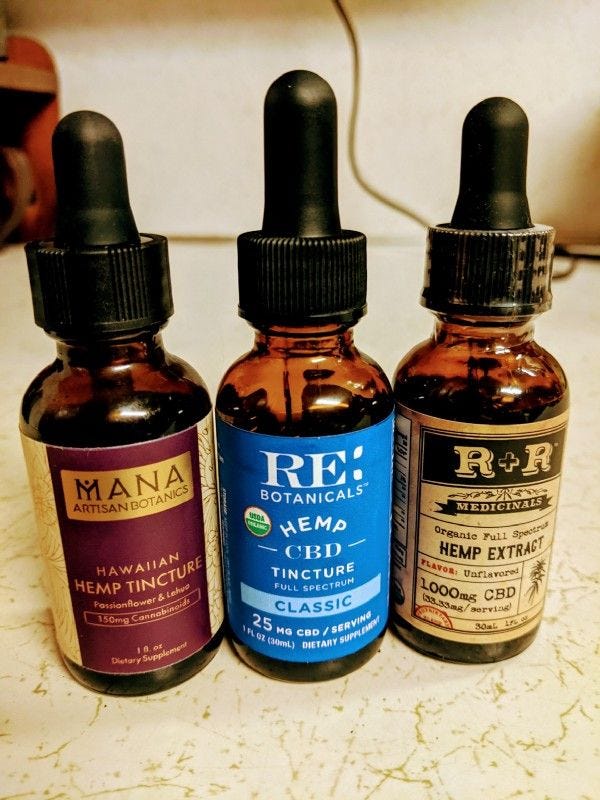Sleep and CBD
Testing some great CBD brands and their effects on REM and deep sleep.
I’m very excited about this post, mostly for my own interests. For the past couple months I’ve been experimenting with various sleep interventions — longer post coming on why this was necessary. So far, CBD has been one of the most effective measures I’ve found. Since (good) CBD isn’t cheap I extended this trial to 14 days each instead of 7. Notice too that the dosing seems to make a difference, particularly that more isn’t necessarily better. The tinctures did have slightly different concentrations, but were generally comparable to each other.
Let’s take a look at the initial 7-day (n-7) data:
Notably here, we see that the gummies (which were a higher dose) were not necessarily better. A few other things also stick out to me:
Mana’s product had a huge boost (22%) to deep sleep, but actually showed a detriment to REM sleep.
RE’s product had a similarly huge benefit (21%) to HRV
All products tested had a notable benefit (~15% or more) to deep sleep.
When I extended the trail to 14 days (tinctures only) we saw a slight decrease in the benefit to deep sleep overall, though Mana continued and actually extended it’s lead here!
RE was the only product to show notable improvements in all categories with no detriments. While it was not as efficacious in promoting deep sleep, though due to the higher percentage (of overall sleep time) owed to REM sleep; the REM+Deep sleep percentages showed an advantage to RE over Mana. Regarding HRV, RR was superior to Mana, though Mana fared better when combing REM and deep sleep.
Terminology and Measures:
Sleep Time — This is pretty obvious though in my opinion not the most significant variable it’s easy to manipulate (e.g. go to bed early, sleep late, take naps). That may be beneficial to our overall health, but makes for poor control comparison. To accomodate for some of this, abosulte REM and deep sleep times were considered rather than relative percentages.
Sleep Score — This is a formula used by FitBit that consideres (A) time asleep, (B) REM + deep sleep, and (/C) restoration — or % of sleep time below average heart rate. A is addressed above, B below, and C as far as I know would be comparable in terms of validity to HRV (below).
REM+Deep(Sleep) — These were tracked separately for inquiry’s sake — as became apparent. Combined though, they’re a good indication of how restful your sleep is. This becomes relevant to sleep time because if you had more time asleep, but the quality was trash you may actually be digging the hole deeper.
HRV — This has become my go-to recovery / preparedness measure. It is the time between heart beats. Simply put, a strong heart won’t be straining (long duration) to complete each beat.
Final Verdict:
Given that sleep time can easily be manipulated and “sleep score” is better addressed by other measures, my “verdict” is made on the combined relative % change (vs. control) in REM + Deep Sleep + HRV.
RR (33mg): 14%
Mana (30mg): 14%
RE (25mg): 17%
Summary:
It seems that while Mana had a huge lead in promoting deep sleep, the deficits in REM and less (compared to the other two brands) effect on HRV caught up. RR was competitive in deep sleep and HRV, but a bit behind the curve in deep sleep. That make RE Medicinals the winner based on my criteria.
Disclosure(s):
For the record, these are all great companies to support (veterans and regenerative agriculture), I wouldn’t have even considered them for testing otherwise.
The length of these trials (14 days) is something I’ll have to mention in the follow up full review of all interventions; which were only measured at 7 days. The reason being I consider 7 days an absolute bare minimum for any test in order to have any kind of robustness in your data-set (that random variance; “when life happens”). If we factor that into 10 interventions, right away were over two months of just collecting data and without establishing a control group and assuming there are no absolute hairball days / weeks (like I said, life happens!).
There was slight variance in the dosage of tinctures due to their various concentrations, however they were all very close to 30mg servings.
The length of the control group was
I have an affiliate application placed with RE Botanicals, but at the time of this publication it has not yet been approved.
Obviously I’m not a fan of the sugar in the gummies, but in the past have had bad reactions to the MCT (common vector oil) in CBD — severe heartburn. That may have been due to various impurities as I didn’t notice that side effect with any of these brands.
Raw data for this test is available on Google Drive.
UPDATE 11/3/21: I was able to get affiliate marketing set up with RE Botanicals. See the referral link below for a limited time discount of $10 (on orders of $50 or more) below. They regularly run sales of 20% — 35% off as well!
RE Botanicals:
$10 off : referral link
Limited Time Offer!




